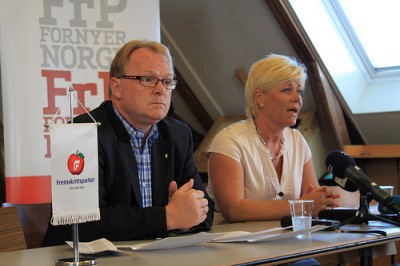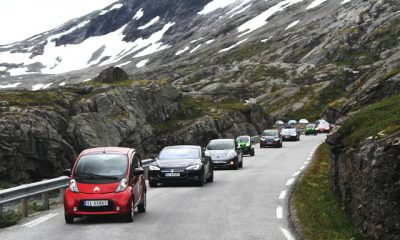UPDATED: Key politicians in Norway’s conservative government were already backpedaling Monday on news that the country would ban sales of diesel- and gasoline-driven vehicles from 2025. “Unrealistic,” claimed a government minister and deputy leader of one of the minority government’s two parties, as he firmly shifted the whole plan into reverse.

Per Sandberg of the Progress Party told newspaper Dagens Næringsliv (DN), which broke the story about a possible fuel car ban just before the weekend, that his party doesn’t back the plan after all. The party’s Members of Parliament have since met, to clarify what they actually have gone along with in a new energy policy initiative.
It was agreed on by the Progress Party, the Conservatives and their two government support parties, the Liberals and the Christian Democrats. It included 16 points meant to strengthen a government Energimelding (Energy Report) released earlier this year, and one of them involved the Parliament’s request for a specific goal for the number of zero-emissions vehicles in Norway by 2029. It implies that the goal should be in line with the “agreed climate goals and technological potential” set by professional agencies, which already proposed in Norway’s National Transport Plan that “after 2025, new private cars, city buses and light transport vehicles should have zero emissions.”
There was no mention in last week’s agreement about how those goals should be reached, but MP Ola Elvestuen of the Liberal interpreted it to mean that only zero-emission vehicles can be sold in Norway from 2025. The Progress Party’s own Øyvind Korsberg seemed to agree, telling DN, “Yes, when we use positive means that give consumers good choices, it will go in that direction, especially when Enova is due to roll out recharging stations for hydrogen cars.” Enova is a state-owned agency charged with promoting and implementing a more environmentally friendly restructuring of Norway’s energy consumption.
Vidar Helgesen, Norway’s environment minister from the Conservative Party, intepreted the new agreement as so exciting that he took a photo of DN’s story on it and published it on social media, calling it a “broad climate- and energy policy” from the four parties that can secure a majority in Parliament and “make a good energy report even better.”

That in turn got plucked up by Elon Musk, the founder of the popular if expensive Tesla electric cars, who clearly thought it all meant that Norway would indeed ban new sales of fuel cars in 2025. “What an amazingly awesome country,” Musk wrote on social media about Norway, which has been one of the top markets for his Tesla Model S cars. “You guys rock!!”
Now it seems Musk and the others have taken the policy curve a bit too fast. Sandberg wasn’t the only politician from the Progress Party, not known for much environmental progressiveness, distancing himself from any looming ban on fuel car sales. They were suggesting through the weekend that Elvestuen, Helgesen, Musk and others had jumped to conclusions, as interpretations of what actually was agreed last week varied widely. When their MPs met to settle the matter, the zero-emission car enthusiasts were likely to be disappointed.
“No, (a ban by 2025) is not realistic,” Sandberg wrote in a text message to DN on Sunday. “When politicians set goals that can’t be achieved, it only leads to loss of confidence. Setting goals for climate emissions is an example.” He and his colleagues ruled out support for any measure that would actually ban sales of diesel- and gasoline-driven cars, but did open up for use of high fees on them to discourage sales.
DN also reported Monday that not only were Progress Party’s MPs were burying any agreement on zero-emission goals in 2025, they also will resume their discussion that all the climate goals agreed in Paris last year are also unrealistic. Sandberg cited “various interpretations” regarding climate goals, and stressed that no ban on fuel car sales had been discussed by the Progress Party’s decision-making entities.
Elvestuen of the Liberals wasn’t giving up, no matter what the Progress Party MPs may come up with in their meeting. “We have an agreement, and we will relate to it,” Elvestuen told DN. “The goal will be to only sell zero-emission vehicles in Norway after 2025.” The professional agencies have also recommended that by 2030, heavier delivery vans, 75 percent of Norway’s long-distance buses and half of all new trucks shall also have zero emissions.
newsinenglish.no/Nina Berglund

